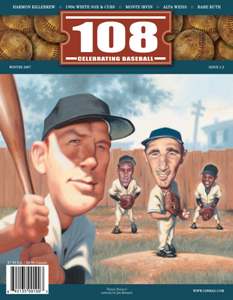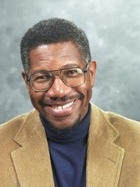Major League Baseball, on April 15, will observe the 60th anniversary of the first black man to play ball in the big leagues, allowing some players to wear Jackie Robinson’s No. 42 jersey on the field that day.
Yet, while baseball celebrates the breaking of its “color barrier,” the spring season is opening with a flurry of news coverage and studies decrying the dearth of African-American players on big-league rosters.

Some have called for sweeping campaigns to bring African-American youth back to baseball, suggesting that many have become isolated from the game by socio-economic barriers, such as growing up in crime-ridden neighborhoods with little access to fields and equipment. Major League Baseball announced plans this week to partner with the Cal Ripken Sr. Foundation to expand the MLB Reviving Baseball in Inner Cities (RBI) program, but many are still struggling to understand why black Americans seem to be deserting baseball.
Gerald L. Early, Ph.D., a noted essayist and black culture expert at Washington University in St. Louis, offers a simple explanation.
“Black Americans don’t play baseball because they don’t want to,” Early writes in his column in the spring issue of 108, a new magazine devoted to the role of baseball in American history and culture.
Early, a consultant to Ken Burns’ PBS documentary on baseball, is the author of several essays on baseball and a member of the Negro Leagues Baseball Museum board of governors.
He argues that blacks have strayed from baseball because it lacks a firm place in their culture.
“Baseball has little hold on the black American imagination,” writes Early in his column, titled “Unpopular Answer to a Popular Question.” “Relatively few blacks watch the game. The game is not passed on from father to son or father to daughter; lacking that, the game simply will not have much resonance with African-Americans.”
Early is the Merle Kling Professor of Modern Letters and professor of English, African & African American studies and American culture studies, as well as director of the Center for the Humanities, all in Arts & Sciences, at Washington University.
Nostalgic appeals don’t work
He argues that baseball faces challenges in marketing to blacks, in part, because it sells itself through appeals to nostalgia and tradition — “that your father took you to the game when you were child, and all that sort of claptrap sentimentality.”

Citing comments once made to him by friend and sports historian Michael MacCambridge, Early argues that nostalgic appeals have little hope of reaching black audiences.
“African-Americans do not look at the American past as ‘the good old days’ or ‘glory days,'” Early writes. “Going back into baseball’s past only leads to segregation and something called white baseball and something else called black baseball, which was meant to be and played under conditions inferior to white baseball. He (MacCambridge) is right ‘You can’t sell baseball that way to blacks.'”
Early also dismisses the argument that African-Americans are “under-represented” in baseball, noting that they make up about 9 percent of players in the major league today, roughly the same as their representation in the American mosaic as a whole.
In the late 1950s, he adds, blacks comprised nearly 20 percent of team rosters and no one raised concerns about them being over-represented. In the mid-1970s, when blacks made up nearly 30 percent of rosters, the biggest complaint seemed to be that steering so many blacks into baseball was perpetuating a damaging stereotype.
“Many people, especially some liberals and some blacks, complained that they were over-represented in the sport, as they were in American team sports generally, that blacks were largely reduced to being entertainers and athletes in America and their over-representation in sports stereotyped them and distorted the young black male’s sense of ambition,” Early writes.
Unpopular stance
Early also dismisses common socio-economic explanations for baseball’s waning popularity in the black community — that inner-city blacks lack access to green space and expensive equipment, as well as the notion (expressed by black sociologist Harry Edwards) that baseball is reluctant to send scouts into “substantially segregated and increasingly violent” African-American communities.
“In sociology, this is called deficit theory, that is, that one group does not do what another group does because it lacks the resources to do it. Deficit theory is almost always wrong,” Early argues.
“Groups rarely feel forced not to do something because they lack something that would make it easier to do the thing in question. Deficit theory is always used to explain the behavior of black Americans.
“If lack of green spaces and the cost of equipment explains why black Americans don’t play baseball today, then how does one account for the fact that they played it in the early 20th century and even organized leagues back in 1920 when they had less money, less space, fewer resources, and faced more rigorous racism than they do now. And doesn’t football require green space, organization, uniforms and the like and blacks seem to have a great pipeline in their communities for developing youth football,” he writes.
Early’s perspective is different from that offered by Cleveland Indian C.C. Sabathia and fellow 108 columnist Mike Veeck. He knows his stance may be unpopular both inside and outside the black community, but he’s sticking with his answer, even though it never seems to satisfy his audiences.
“Black people have agency as much as any other group. They are not simply sociologically determined, as believers in the deficit theory seem to think.
“I say that the simplest answer is probably the best: I assume black Americans don’t play Major League Baseball so much these days because they don’t want to.”